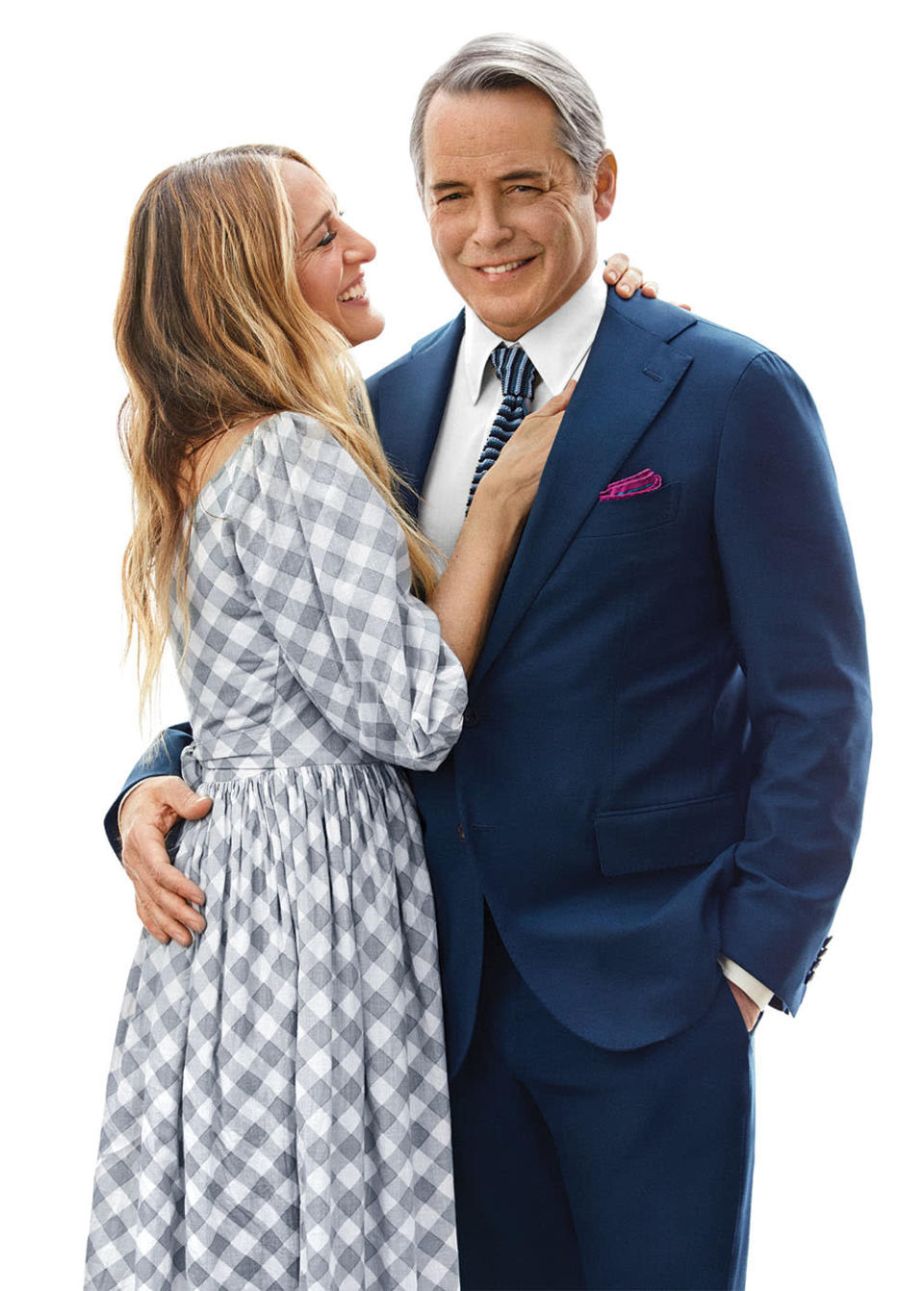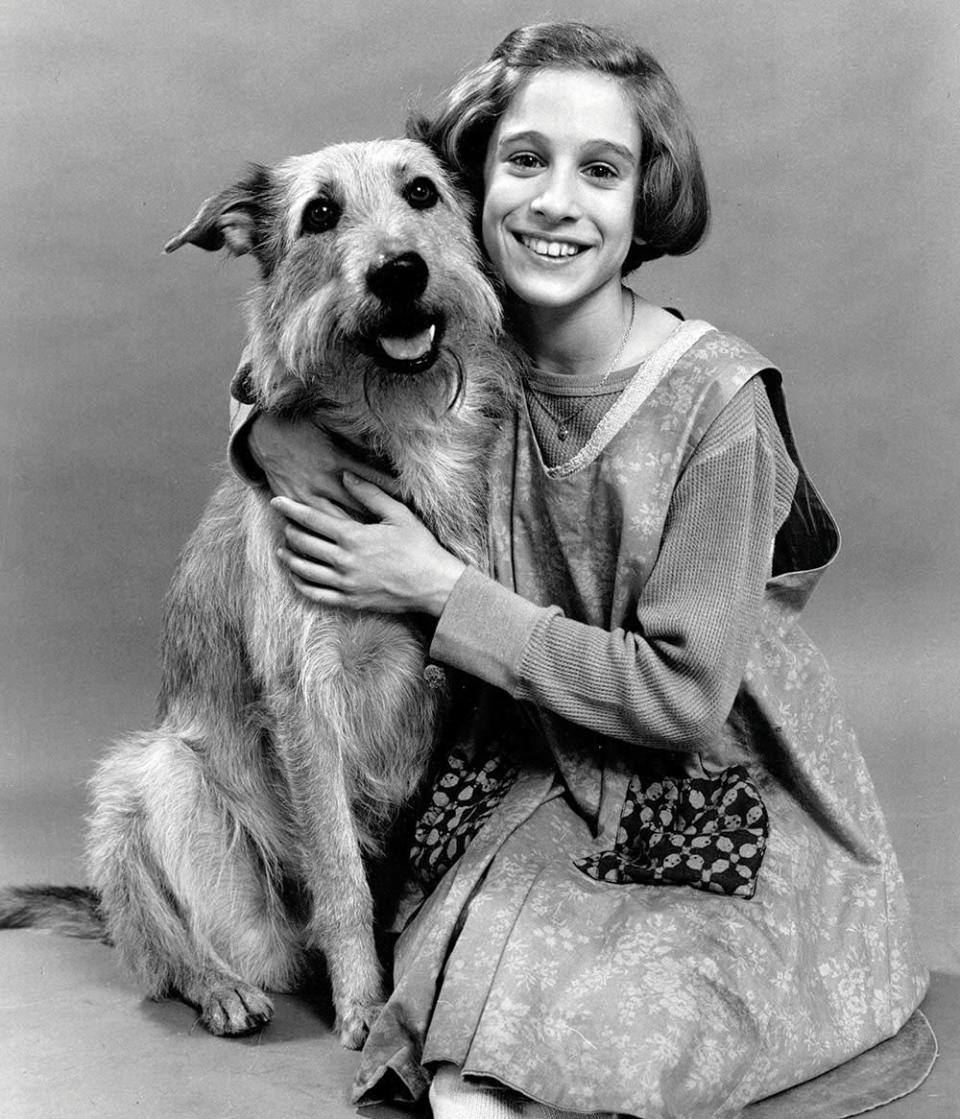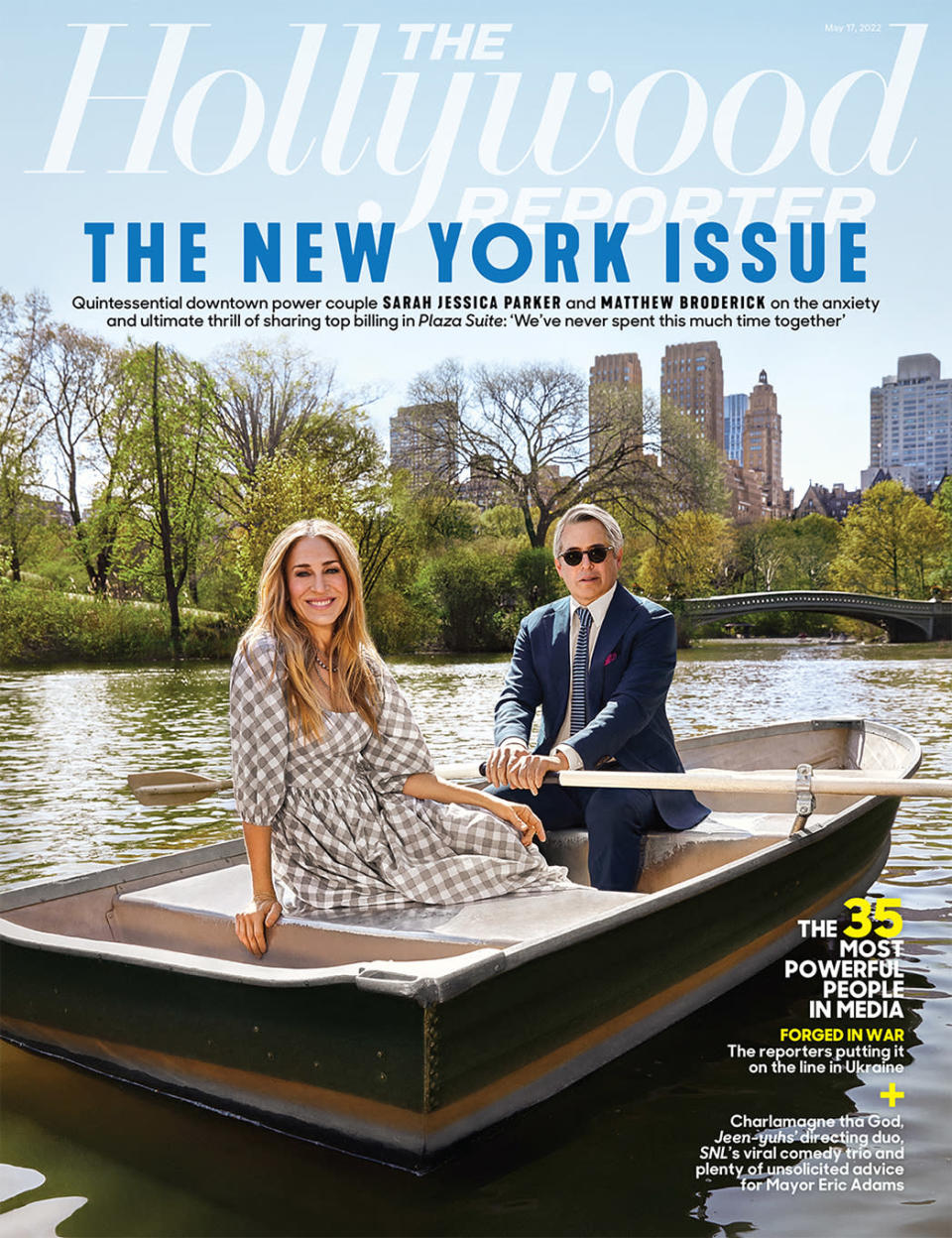
Signs and banners advertising the revival of Neil Simon’s Plaza Suite went up on 43rd Street’s Hudson Theatre in early March 2020. Above the marquee were glamorous portraits of its stars, Sarah Jessica Parker, 57, and Matthew Broderick, 60, New York’s most famous — and famously private — acting couple sharing a stage together for the first time in nearly 30 years. In hindsight, if a Broadway mystic had told the show’s creators that the signage would remain there for more than two years, they would have popped champagne. Unless they were told why.
Parker and Broderick were onstage in full wigs and costumes on the afternoon of March 13, hours before the first preview performance, when they saw their colleagues huddled in conversation. “We kept going like, ‘What are you guys talking about?’ ” Parker recalls. “And then they said, ‘We all have to be out of Times Square by 5 p.m. The governor called it.’ It was pretty dramatic.”
More from The Hollywood Reporter
After two years of pandemic-related closures devastated Broadway, the reopening of Plaza Suite felt something like a turning point: a comforting throwback not just to Simon’s New York of 1968 but also to the relatively carefree New York of early 2020. The city was back! But within a week of opening night, both Parker and Broderick tested positive for COVID-19 and were out for 10 days. Her first day back onstage, Parker still had a lingering cough, taking sips of her prop martini to soothe it.
The show consists of three one-act plays taking place in the same suite of the Plaza Hotel, each reflecting late-’60s sexual politics in ways that have made some critics arch their eyebrows. The public doesn’t seem to mind: The run has been extended three times. Parker and Broderick play all three couples with starkly different voices and affects. Judging from the gleeful reactions to some of Parker’s costumes, much of the audience has come to see Carrie Bradshaw, the fashion-forward scenester she played on six seasons of HBO’s Sex and the City and its 2021 reprise, And Just Like That. For many in the crowd, Broderick will likewise eternally be Ferris Bueller. But to theater connoisseurs, the actor — who won a Tony for his performance in 1983’s Brighton Beach Memoirs and worked with Simon several more times after that — is a living connection to the playwright, who died in 2018.
Sitting together in the Hudson Theatre’s orchestra on a recent afternoon, Parker and Broderick — who met in 1991 and were married six years later — have an easy, well-worn repartee nothing like the squabbling pair(s) audiences will see a few hours later. They frequently complete each other’s thoughts as they discuss everything from And Just Like That’s picked-apart plotlines, to Broderick’s villainous turn as Richard Sackler on the upcoming Netflix series Painkiller, to what it will take to get New York firmly back on its feet.
When you got COVID-19, did you ever at any point feel sick enough that under normal circumstances you would have canceled the show?
SARAH JESSICA PARKER No. We’ve both been much, much, much sicker and performed. It’s anathema to what we’re taught as actors, which is that you perform literally with a 102.3 fever, you vomit in the wings, you come back. It’s very odd to basically not have any symptoms and not be allowed to return to work.
MATTHEW BRODERICK Yeah. It’s frustrating. In most businesses, after five days you’d be allowed back. But [for Broadway] it’s 10, so that last five days when you’re testing negative and feeling fine is sort of frustrating. But there’s a reason, which I didn’t even realize. It’s because in our particular business, we can’t wear a mask.
Sarah Jessica — do you go by Sarah Jessica?
PARKER You can call me S.J. if that’s easier.
You were once asked what the secret to long-lasting marriage was. And you said, “We both have jobs that allow us to step away from each other and come back together.”
PARKER Now we have to find another reason to be interested in each other’s company.
Was there any concern about working with each other day in, day out?
PARKER Not consciously. I think we were more so thinking about the play, like, “How are we going to do this?” And I only thought about being concerned when people ask us, “Are you concerned that this is going to be harmful to your marriage?” And then I was worried. “Well, should we be?” We’ve never spent this much time together ever, even before we had kids. [The couple has three children: James, 19, and twin daughters, Tabitha and Marion, 12.] Even when we were just dating. But it’s a very different kind of time. It’s not like we’re spending more time together talking. We’re spending time together working in an alternate universe. We’re not ourselves. And we don’t always go out together after the show. And now our days are freed up again. So we still have our autonomy during the day. So it’s feeling more kind of like it used to. But it’s been great.


Photographed by Danielle Levitt
There’s a lot of physical comedy in this.
BRODERICK Do you think it’s a little too much?
Not at all. It’s just not a register we’re used to seeing you work in. Especially the slipping and the sliding in the second play.
BRODERICK Well, they gave me these shoes that don’t have any grip, and it’s on carpet. So I slipped a little bit. And then I was like, “Oh, that seemed funny. So let me do that times a hundred.” Buster Keaton and Charlie Chaplin have always been favorites of mine, since I was a little kid. In The Producers, there was a lot of physical comedy. I may not have done the most of it, or be the greatest at it, but I absolutely love it.
Now that you’re observing the intricacies of the way the other works, what surprised you about each other’s approaches?
PARKER I always come to see whatever Matthew’s doing, and so I’m very familiar with the way he works. Really, the revelation for me was, “Wow, we can work together.” Matthew tells a story of when he did a play with his dad when he was very, very young [Horton Foote’s Valentine’s Day]. He’d spent his whole life up to that point as his father’s son, and then they were onstage together. He was looking at his father. He’s like, “Why are you talking like that?” It was embarrassing to pretend to be somebody else, in a way.
BRODERICK Yeah, it felt weird to be acting with him. “Why do you have a Southern accent?”
PARKER My greatest concern is that it would feel ridiculous. But the revelation was that I wasn’t embarrassed to do this in front of him. I wasn’t embarrassed to be three other people to his three other people.
You mention the three very different characters you each play. Did you find elements to identify with in all of them?
PARKER I don’t really identify with them. But they’re not foreign to me; they’re just not experiences or choices that I’ve had myself.


Courtesy of Joan Marcus (3)
You’ve been careful about keeping your relationship private. Did you worry doing this play together would be an invitation for the press to write about your marriage?
PARKER We did.
BRODERICK That was a scary thing.
PARKER I think we’ve kind of figured out how we can talk about the work and also be coy about us. Because it seems fair and right: If I was a person interviewing us, and we were doing a play about marriages and relationships, it would be awfully difficult to not ask where it overlaps with our lives. I’ve always said one of the reasons we’ve had success is because we don’t talk about our marriage. I’m not flattering myself that anyone’s discussing my marriage, but we’re certainly not going to add to it by saying, “Well, this is why it works.” Next thing you know, there’ll be a very public divorce. So we just try to respect each other. I think I learned early on when I was talking too much. I was like, “I’m in love. When’s he going to marry me?” Oh my God, I’m so sorry about that. I’m still apologizing for that.
BRODERICK Don’t do that.
What do you make of the criticism that …
PARKER We don’t read reviews.
OK, of the notion that you can’t watch a period piece like this — reflecting outdated sexual politics — without mapping contemporary norms and values onto it?
PARKER Yeah, I think we’ve gleaned that is something that people have talked about. I think that that’s unfortunate because who are we? Where did we come from? Did that era not happen? Did it not exist? I’m just so curious why we don’t hold Shakespeare to the same standards we’re holding Neil Simon. Shakespeare’s women are often horribly trapped and speak of a very different time. But we still have to look at these plays. We can’t just decide they don’t have relevance. Neil Simon is writing this in 1968. We can’t just decide that all plays that existed before we were having these more challenging conversations don’t have a place.
BRODERICK Plays are done in the time when you do them. So we are putting our own life and times onto this. I don’t even know in what way, but … I like to think that if you are very accurate about a group of people — whether it’s a poor family or a wealthy family, whatever it is — that if you make it human enough, it ought to be able to translate to other groups. The theater is in a weird time where — I want to be so careful — but can I watch a play about a family in Puerto Rico without being from Puerto … I don’t know how to explain it. I’m allowed to translate people’s experiences and their culture, [even if] it’s not my culture.
PARKER But you want to connect to it.
BRODERICK But it relates to my culture. When I did Brighton Beach, I remember talking to somebody who was African who said, “I felt like I was watching my own family.” Because we had created a real-looking family. He didn’t say, “God, I’m not from Brooklyn and I’m not Jewish.” He just said, “That’s how my mom treated me.” So that’s the part of theater that I like. Having said that, I do wish I looked out here and saw a much more …
PARKER Diverse.
BRODERICK … mixed audience. I desperately wish that.
How does one achieve that?
BRODERICK I don’t know. That’s a very good question. I don’t think you do it by trying to make every play speak to everything. But I do absolutely agree with the goal that this audience should be filled with every walk of life. That was a huge problem when I started, too. I’ve always wished tickets were cheaper.


Courtesy Everett Collection
S.J., you’ve referred to Sex and the City as a “relic.” With the new chapter, And Just Like That, you’ve had a chance to address how society has evolved since the original show. You leaned heavily into contemporary discussions about sexual politics and race and gender — such as with Miranda’s affair with the nonbinary Che Diaz, played by Sara Ramírez. Tell me about that choice of emphasis.
PARKER Well, I think it wasn’t effortful except we wanted to do it well, and hopefully have [actors] join us who we had fantasies of bringing on. For Sarita Choudhury [who plays Seema], or Sara, or any of our new actors to say yes, what are the stories? The burden is not on me because I can’t write, but [showrunner] Michael [Patrick King] knew that. [The question was] how do we open that world up? And how do we make it real? We have a great writing room of, once again, all women, but the room is more diverse now. That wasn’t a mandate, no one told us it had to be that way. Michael wanted it that way, and it will continue to evolve.
There have been strong reactions on social media, which is something that didn’t exist in the first run of Sex and the City. To what extent do you think that the work you do now must cater to fan expectations?
PARKER First of all, I’m rarely on social media. [Matthew’s] not on it at all. I’m on Instagram, and I have a very conflicted relationship with it. Obviously, we’re aware that people have opinions, and there will be peripheral chatter specific to the HBO show. We care that they’re engaged and enjoying it, flipped out, upset, thrilled, devastated, but you can’t have a result in mind and then try to back into it with the writing. That would just be awful. And that would be like riding a bike with a gang of 10 million. Michael’s not afraid of chatter. There’s just so much out there, so if someone’s talking about us — which they were apparently every week with recaps and breakdowns — Michael’s like, “You can’t beg for that [kind of attention]. So let’s keep doing what we’re doing.”
As And Just Like That premiered, two women publicly accused your co-star Chris Noth of sexual misconduct — allegations that he denies. As a producer, what was your reaction?
PARKER I don’t even know if I’m ready to talk about it, but I don’t think … I wasn’t reacting as a producer. I should have worked on this because I’m just … it’s just …
Have you spoken to him since then?
PARKER No.
And Just Like That returns to a bustling fantasy of New York. How challenging was it to portray the city that way amid the pandemic?
PARKER When we started shooting, that’s what New York was feeling like. I don’t know if you remember that moment when outdoor dining started and you really started to feel like, “Oh my God, the West Village is dazzling.” It happened pretty early. It [was] so exciting. But as you remember, it was like riding a wave. And then we would have surging numbers. But when we went back, I don’t know if you noticed it, but like in Carrie’s apartment, there’s masks by her front door.
I didn’t notice.
PARKER Yeah. And a couple times I would pull a mask out of my bag. Or I’d get hand sanitizer out before I ate in a restaurant. We went back and forth a lot about masks or not masks. And HBO was like, “We’d really like to try to shoot in the city without a lot of that.” So that was a conscious choice. And then delta came. But once we’d made a decision, we had to stick with it. We couldn’t address every variant.
Since the beginning of the pandemic, there’s been endless hand-wringing about how New York has lost its mojo. It’s starting to bounce back, but there’s trepidation …
BRODERICK Yeah. It feels like we’re not sure what it is yet. “Great city if they ever finished it.” That’s what they always say about it. This whole city’s always about to fall apart in some way.
PARKER But that’s OK. That’s different than a pandemic.
BRODERICK Yeah, it is.
PARKER Like, those awful times after September 11th. We all knew what to do.
BRODERICK Yeah. That was very different. Because it was like, “Come outside, come eat, come sit next to other people.” And this time it’s been like, “Don’t come out, don’t help. Don’t spend money.” It’s a little harder to figure out how to come back.


Photofest
Do you miss the freewheeling decadence of New York in the ’90s?
PARKER All I miss about that is just …
BRODERICK Playland.
PARKER It was an amazing pinball arcade on 52nd and Broadway that we both went to because we both worked on Broadway in the same theater at different times. But I think the only thing we miss is crowds. Not the way money was thrown around and not all of that crazy, go-go stuff that was happening. I just miss crowds, like being among everybody and not being worried. Just squeezed up against people on the subway, or at a ballgame.
BRODERICK And the ’90s were a little less gentrified, I guess. It was still more neighborhoods. They all start to get a little the same.
Why have you never left the West Village? Was there ever talk of it?
PARKER He never left, and where he goes, I go. And I moved to the West Village before I met him.
BRODERICK I left the West Village for a little while.
PARKER You did?
BRODERICK I lived in SoHo at Charlton Street.
PARKER Oh, right. But that’s just south. You didn’t go north. The farthest north he’s ever lived is 11th Street.
BRODERICK And I’m uneasy with 11th Street, because 14th, of course, is a very strict border that nobody must ever live above.
PARKER But it’s a weird thing with you. Because you will go explore anywhere — and he’ll walk. He walks the city all the time, like the entire city.
BRODERICK During the pandemic, I got into it.
PARKER So it’s not like he’s not interested in any of that. It’s just all you know is your grocery store, your butcher, your shoe repairman. So going north is like, “Where do you get milk?”
BRODERICK So I don’t seem quite as crazy as I am, I went to high school on the Upper West Side. And there are other neighborhoods I love. I would like to live up there.
PARKER But you just don’t know it.
BRODERICK I’d even like to be with the swells on the Upper East Side.
PARKER We don’t know anybody there.
BRODERICK Nobody knows anybody up there. You just walk around.
Matthew, I read that you used to ride your bike everywhere in Manhattan as a kid.
PARKER He still does. Rides it to work.
It’s a very different ride these days, isn’t it?
BRODERICK Oh yeah. It’s like Amsterdam. Beautiful bike lanes, with lots of people going the wrong way and stepping into them looking at their phone and then screaming at you.
Are you an aggressive cyclist?
BRODERICK No, I don’t think I am. I think I was …
PARKER He was. He was aggressive.
BRODERICK But because there are so many bike lanes now, and they’re safer — you’re not in traffic the way you were, so you’re not fighting for your life — the feeling is a little different. And I’m now one of the curmudgeons who doesn’t like the aggressive cyclists. Sometimes I’m aggressive. I’m in a transitional period.
PARKER For years, when I met him, he had a bike with no brakes. Now he rides Citi Bike all the time.
Matthew, you’ll soon be appearing on the Netflix series Painkiller, in which you star as Richard Sackler [former chairman and president of Purdue Pharma]. What about the topic of the opioid crisis resonated with you?
BRODERICK I had a mom who had cancer and was on those pills. She was in absolute agony, and they helped her a great deal. So I’ve seen both ends of it. I know how bad they are. And I know what a miracle [they can be]. It’s a complicated story. Because obviously they then marketed it for people who didn’t need them and all that, and it’s horrible. But I have experience from both sides.
Do you advise each other on which roles to take?
PARKER We talk about it sometimes because it affects our family. So that’s a big part of it, like, “Well, if you do that, you won’t be able to take James to college,” or, “You’re going to miss this,” or, “I’ll miss this.” Like, Matthew at the same time as Painkiller was offered another big miniseries for a different network. And we went back and forth.
BRODERICK Yeah. I went from nothing during the pandemic and suddenly had to decide between three things in a weekend. But it wouldn’t be common for me to be cast as Richard Sackler, so there was something sort of attractive about that.
Interview edited for length and clarity.


Photographed by Danielle Levitt
This story first appeared in the May 17 issue of The Hollywood Reporter magazine. Click here to subscribe.




